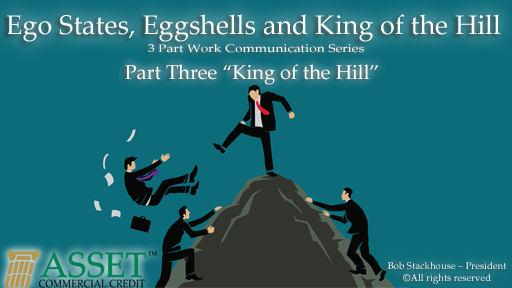Have you ever learned something that empowered you to help others throughout you career? Sharing stories is the focus of this series. Here is another gem from my past designed to help with managing people. This core concept/analogy has also been used many times to help employees and friends who are having issues with others to find a productive path to solving their own communication issues. This next one is about power, authority and control.
You all remember (though perhaps not) that a common game kids play is King of the Hill (find a three-foot mound and try to stay on top while your friend tries to physically knock you off then they take your place). You might have played tag, dodge ball or some other competitive game. A question to ponder is: are kids naturally competitive or do we teach them to be competitive? Personally, I think humans are naturally competitive. You just have to look at sports to see competition that is not limited to children. My co-worker just told me of an adult version of king of the hill that is played on a tennis court.
Adults play king of the hill in the workplace, though it is disguised and not necessarily physical. Some of it is productive while some is not. It tends to be about power, authority or control. Understanding what is driving the game helps to find the most effective solution.
Let’s talk about control first. It’s my opinion everyone needs control over something in their lives. Some have a big need while some have a smaller need. My theory about aggressive drivers is that they are exerting control over other drivers because they are being controlled in some other aspect of their lives that they are unhappy about. My theory about teenager’s acting out is that they are attempting to say: Here I am! I am not your property but an individual human being. Basically, it is them taking control of their lives, sometimes rejecting their parent’s control. So, if we have an enate need for control, a work place can be a bit happier if everyone has control over something. By ensuring they have control, less King of the Hill is played.
Power is also something that many people crave. That can be a good thing in that leaders need to be driven but we should also be aware of how their need affects others. It can be a bad thing when a subordinate is in a power play with their boss. It may even feel like which dog is the last to pee on the fire hydrant. That analogy can cause people to back down when they realize that they are exhibiting animal behavior. A subordinates need for power can surface like a game of King of the Hill. Ultimately, power seekers have a drive that when combined with knowledge, understanding, and empathy make good managers and leaders. So, my advice is to discuss power openly (that makes a world of difference in itself) and have complete training available for the other skills employees need to grow and thrive. If training and support are not available then let the power focused people move on. Otherwise, it will be disruptive in the workplace.
Authority in the workplace is also an interesting point to consider. It is interesting that a business’ life cycle is integral to the formality of Roles and responsibilities. Young business tends to be loosely managed thereby creating an atmosphere where creativity is fostered. Employees gets their guidance from a quality Mission Statement, a Vision as to what or where the company wants to be/go, and clear Values that are the foundation of the business’ culture. More mature businesses tend to rely on a business structure which has more formal lines of authority. I’ve seen many businesses that are in the process of becoming more formal but are not yet there. When roles and responsibilities are partially implemented but not clearly defined, workplace authority issues erupt. Team members that want to lead, but are not in leadership roles can be disruptive.
There are different solutions based on the core issue, though the surface problem may look the same. When one is trying to understand a particular situation that needs resolution, one can ask; Is this a power, a control, or and authority type of issue. Once you settle on what kind of issue it is the solution seems to be easier to find.
Bob Stackhouse – President, Asset Commercial Credit
©All rights reserved




